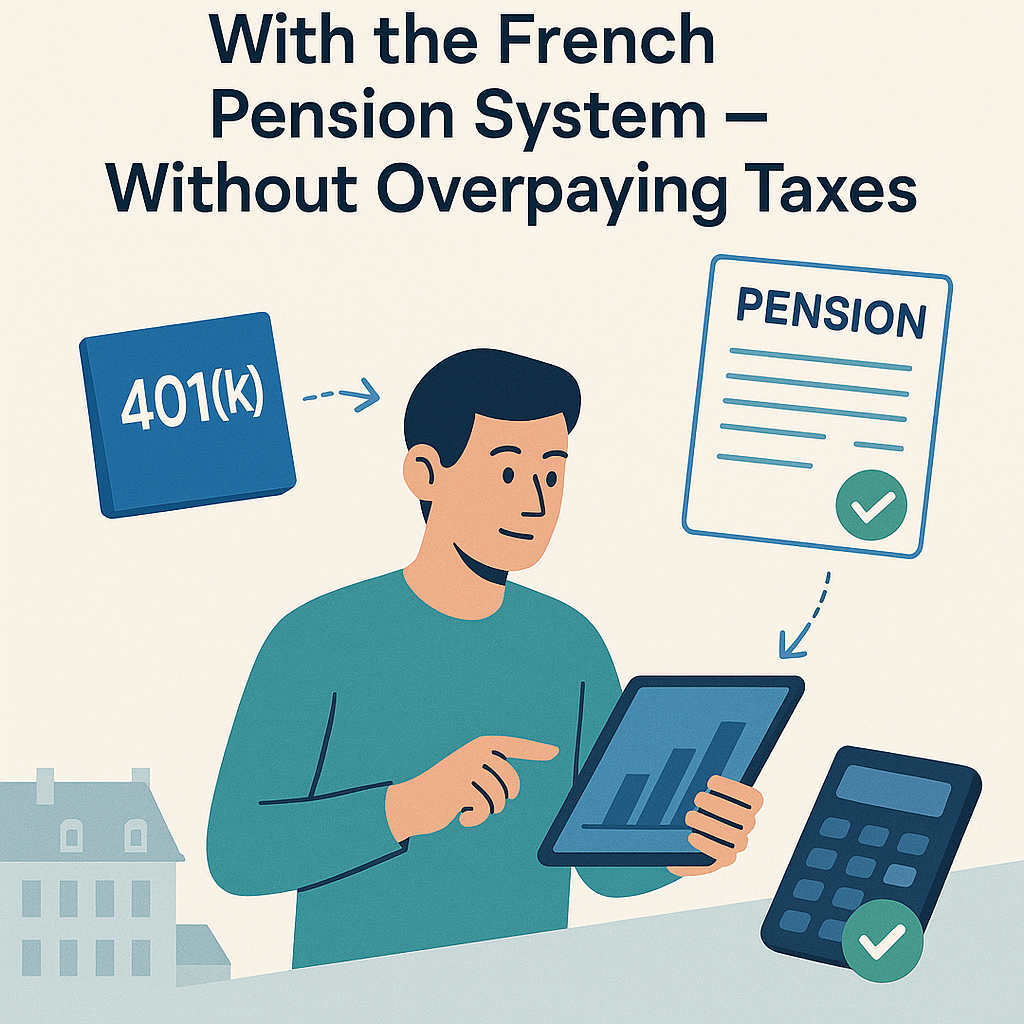How to Combine a U.S. 401(k) With the French Pension System — Without Overpaying Taxes

If you're an American professional earning $150K–$300K and considering a move to France, you're probably wondering: Can I keep my U.S. 401(k) and also benefit from the French pension system — without getting hammered by taxes?
The problem is uncertainty about overlapping retirement systems, which causes fear of penalties or double taxation. You want to maximize your retirement income while minimizing friction between two very different systems.
Here’s how to make them work together — efficiently.
1. Understand the Structure of Both Systems
U.S. 401(k):
- A tax-deferred investment account
- Funded by pre-tax income
- Withdrawals are taxed as ordinary income (unless Roth)
French Public Pension (Sécurité Sociale + Agirc-Arrco):
- Mandatory participation for salaried workers
- Contributions come from employer and employee
- Benefits are based on years worked and salary level — not market returns
These two systems are structurally different but not incompatible.
2. Use the U.S.-France Tax Treaty to Your Advantage
The bilateral tax treaty between the U.S. and France:
- Prevents double taxation
- Allows you to claim foreign tax credits
- Ensures retirement distributions are taxed in only one jurisdiction (if declared correctly)
✅ Key Point: U.S. retirement account withdrawals are generally taxed only in the U.S., not again in France — if handled properly.
What to do:
- File U.S. taxes annually (required by law)
- Declare your foreign assets to the French tax office
- Use IRS Form 1116 for foreign tax credit claims
3. Don’t Cash Out Your 401(k) — Align It Instead
Never liquidate your 401(k) before relocating:
- You’ll face income tax plus a 10% early withdrawal penalty (if under 59½)
- You’ll miss out on long-term growth
Instead, do this:
- Keep your 401(k) as-is, or roll it into a Traditional IRA with an expat-friendly provider (like Schwab)
- Let it grow tax-deferred while you live and work in France
4. Contribute to the French Pension — It’s Mandatory, but Useful
Once you’re salaried in France, you’ll automatically contribute to:
- Base pension (Sécurité Sociale)
- Supplementary pension (Agirc-Arrco)
Even a short period (5–10 years) gives you vested benefits you can claim later — even if you leave France.
Bonus: Employer contributions often match or exceed yours.
5. Avoid Double Taxation on Retirement Withdrawals
To avoid mistakes later:
- Track your U.S. contributions and potential distributions
- Plan your withdrawal strategy around when and where you retire
- Use the treaty to ensure your income is only taxed once
If you plan to retire in France:
- Withdraw U.S. retirement funds strategically after age 59½
- Declare them under U.S. law, but inform French authorities per treaty reporting
- Use a tax advisor to prepare coordinated filings
6. Consider a Roth Conversion — But Plan Carefully
While in a lower tax bracket (e.g., post-move), it may be beneficial to convert part of your 401(k) into a Roth IRA:
- You pay U.S. tax now at a lower rate
- Withdrawals are tax-free later
⚠️ Warning: Roth accounts are not always recognized the same way in France. Get expert advice before converting.
7. Work With a Cross-Border Planner
This isn’t a DIY spreadsheet task. A qualified planner can:
- Model your future tax exposure across both systems
- Help time your withdrawals from U.S. and French sources
- Structure a mix of pensions, IRAs, brokerage, and real estate assets
Look for CFPs or advisors familiar with:
- U.S. expat retirement tax
- French public retirement rules
- Bilateral treaty compliance
Final Word
Yes — you can combine a U.S. 401(k) with the French pension system and retire with a smart, legally optimized plan. The key is:
- Don't panic or cash out
- Use both systems as complementary tools
- Get professional advice early
With careful planning, you can enjoy:
- U.S. retirement growth
- French pension security
- A tax-smart strategy for wherever you choose to retire
📩 Questions? Reach out to us at franceexpatservices@gmail.com. We’ll connect you with cross-border advisors, expat tax help, and relocation support.
Next up: "Can I Still Save for Retirement in France Without Breaking U.S. Tax Rules?"




